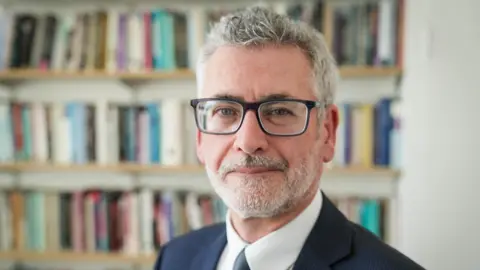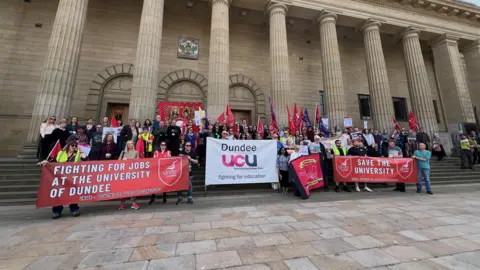 BBC
BBCDundee University have announced an “alternative pathway” to solving the financial crisis at the institution that will see fewer job cuts than feared.
Under the proposals, the university will shed around 300 roles through a voluntary programme – after originally forecasting around 700 jobs would go.
Shane O’Neill, the interim principal at Dundee, said the “revised direction of travel” had been approved by the university court.
The university will seek additional public funding under the new scheme, which would also see further cost reductions pursued and a new operating model put into place.

Prof O’Neill – who previously told Holyrood’s education committee as many as 700 posts might have to go – said a number of steps still needed to be completed for the new proposals to work.
He said: “We have been continuing to have positive and constructive engagement with the Scottish Funding Council and other stakeholders to develop an alternative pathway towards financial recovery.
“We have sought to find a financially viable way forward that would mitigate substantially the immediate need for large numbers of job losses.”
Last week staff at the university voted for strike action over the proposed cuts, and a rally was held outside the city’s Caird Hall at the same time as the university court was meeting to discuss the new plan.
The university announced last year it was facing a £35m deficit and that hundreds of jobs would be lost.
The institution currently employs 3,259 people on a full-time basis, with 271 jobs currently unfilled.
Prof O’Neill added “significant additional public funding” would be required for the alternative funding strategy to work.
He said: “There are still several challenging steps to be taken in order to clear this pathway to progress. We also need to ensure that the steps we take do succeed in allowing us to access commercial lending, as that will be essential for long term sustainability.
“The proposed route forward will require significant additional public funding. We are engaged in discussions, through the Scottish Funding Council, as we look to secure that support over the next two years, including any related conditions and assurances. Further liquidity support funding may also be required.”

Among the key elements of the new plan are reconfiguring academic units and professional services, securing more commercial finance and consolidating efficiencies.
A new taskforce – headed by former principal Alan Langlands – was recently announced to help the university.
It comprises a group of experts from academia, industry and local and national government who will “advise on the future success” of the university.

